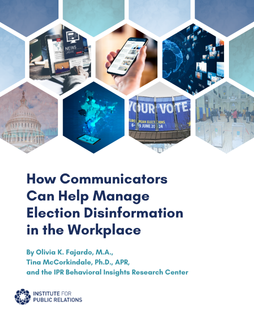This summary is provided by the IPR Street Team based on the original study, “Corporate Social Advocacy as Public Interest Communication: Exploring Perceptions of Corporate Involvement in Controversial Social-Political Issues” by Lucinda Austin, Barbara Gaither, and T. Kenn Gaither in the Journal of Public Interest Communications.
Summary
Corporate social responsibility (CSR) is increasing in importance as corporations hold more and more power in society. Research shows that consumers’ expectations for organizations to take a stand on important issues are ever-growing. This study examines three cases of high-profile CSR initiatives and the perceptions surrounding them.
Methodology
A national survey of 1,214 people was conducted. The survey was conducted to determine how the public perceives corporate social advocacy, including when and how a company should intervene to take a stand on social issues. Three CSR cases from Nike, Dicks, and Gillette were used to measure respondents’ opinions: the gun control initiative done by Dicks following a mass shooting in Florida; the initiative to combat toxic masculinity done by Gillette; and the Colin Kaepernick “take a knee” initiative by Nike.
Key Findings
- A majority of respondents believed Dicks was more change-oriented than Nike and Gillette were.
- The Dicks initiative for gun control was perceived to be the most stakeholder-driven, followed by the Gillette initiative. The Nike “take a knee” campaign was perceived to be the least stakeholder-driven.
- Dicks was also perceived to have the highest level of values-driven CSR, followed by Gillette. Nike was perceived to have the lowest level of values-driven CSR.
- Gillette was perceived to have the highest level of strategy-driven CSR, followed closely by Nike and Dicks.
- Nike’s “take a knee” campaign was most perceived to be ego-driven, followed by Gillette. The Dicks campaign had the lowest perception of being ego-driven.
Conclusion
Overall, the majority of respondents agreed that corporate social advocacy (CSA) was necessary for the improvement of society. Dicks was deemed most trustworthy and motive-oriented because they took concrete action. This highlighted how companies who focus on CSA can reach another level of transparency with the public.
Most respondents stated that companies should be actively supportive of the best interest of the public, however, there were differences in responses based on different political viewpoints and demographics. Most supportive of CSA were young and/or liberal, whereas older and/or conservative people skewed away from this type of action. Young liberals believed a company should be social advocates even when their business or product had no relevance to the issue. Older, more conservative people tended to respond in favor of company’s only acting on issues within their realm of relevance. Overall, CSA was well received by respondents when they believed the company was doing CSA for the right reasons.




